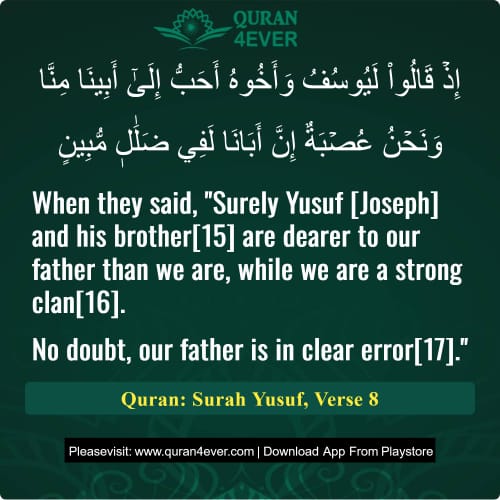
Transliteration:( Iz qaaloo la Yoosufu wa akhoohu ahabbu ilaaa Abeenaa minnaa wa nahnu 'usbatun; inna abaanaa lafee dalaalim mubeen )
"When they said, 'Surely Yusuf [Joseph] and his brother [15] are dearer to our father than we are, while we are a strong clan [16]. No doubt, our father is in clear error [17].'"
It should be remembered that Hazrat Yaqub (peace be upon him) had four wives: Rahil (Rachel), Laya (Leah), and two slave girls, Zulfah and Balha. From these four women, he had twelve sons and a few daughters. From Laya, he had six sons and one daughter: Rubal, Shamoon, Yahood, As-Sheejar, Zamayoon, and Ladi. From Rahil, he had Hazrat Yusuf and Benyaamin. From the slave girl Zulfah, he had two sons, Jaad and Ashar, and from Balha, two more sons, Daan and Niftaali.
Initially, Rahil was barren, and in old age, she gave birth to Hazrat Yusuf and Benyaamin, after which she passed away. At the time of her death, Hazrat Yusuf (peace be upon him) was only two years old. Naturally, among all his children, Hazrat Yusuf was most beloved to his father.
By saying "we are a strong clan," the brothers meant that they were many in number, young and physically strong, and thus capable of serving their father better. However, they failed to understand that, having lost his mother in infancy, Yusuf received extra affection from his father — a natural and justified form of love. From this, we learn that preferring one child due to weakness, age, or need is not sinful, but injustice among children is forbidden in Islam.
This part of the verse shows that disagreeing with a Prophet’s opinion is not infidelity, because the brothers of Hazrat Yusuf (peace be upon him) caused pain to Hazrat Yaqub (peace be upon him) and even declared his view to be mistaken. Yet, the Holy Qur’an did not label them as disbelievers, nor did Hazrat Yusuf require them to repent or recite the Kalimah again after their reunion.
Therefore, it is incorrect to consider Amir Muawiya (may Allah be pleased with him) sinful or misguided due to his political opposition to Hazrat Ali (may Allah be pleased with him). Here, the word "dalaal" (error) does not mean misguidance in the sense of disbelief. Rather, it refers to Hazrat Yaqub being deeply absorbed in his love for Hazrat Yusuf (peace be upon him).
The tafsir of Surah Yusuf verse 8 by Ibn Kathir is unavailable here.
Please refer to Surah Yusuf ayat 7 which provides the complete commentary from verse 7 through 10.
(12:8) And call to mind when the brothers of Joseph conferred together and said: “Surely Joseph and his brother[8] are dearer to our father than we are, although we are a group of so many. Our father is clearly mistaken.[9]
8. This brother was Benjamin. He was the real younger brother of Prophet Joseph, and was his junior by many years. Their mother had died at the birth of Benjamin. That is why Prophet Jacob paid special attention to these two motherless children. Besides, Joseph was the only son, in whom he had discerned signs of righteousness and capabilities. Accordingly, when Prophet Joseph narrated his dream to him, he was all the more convinced of his future greatness, and was perturbed at the idea lest his brothers conspired against him out of envy, if they came to know of his dream, which was self explanatory. For Prophet Jacob knew that his other ten sons were not of the right type, and this was proved by the subsequent events. Therefore, naturally he was not happy with them. It is, however, strange that the Bible gives a different reason for the envy his brothers bore against Prophet Joseph. They were filled with envy against him because Joseph gave unto his father their evil report.
9. In order to grasp the full significance of the grievance the ten sons had against their father for neglecting them, we should keep in view the conditions of the clannish life. As there was no established state, each clan led its own independent life side by side with other clans. It is obvious that the power of the head of the clan depended entirely on the number of sons and grandsons, and brothers and nephews he had to defend the life, honor and property of the family. Therefore, the one leading the clannish life naturally paid more attention to his own grown up sons, etc., than to children and women of the family. As Prophet Jacob was leading clannish life, these sons of his expected a preferential treatment from him, but the Prophet thought otherwise. So they remarked: Truly our father seems to have lost his balance of mind; otherwise he could not have neglected us, and loved our two younger brothers more than us, for we are strong young men and can stand him in good stead at the time of need while these youngsters are useless as they themselves stand in need of protection.
[585]- Benjamin, who was born of the same mother as Joseph.

For a faster and smoother experience,
install our mobile app now.
Related Ayat(Verses)/Topics